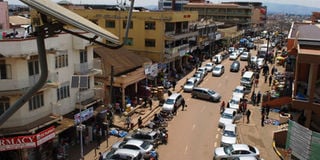HIV/Aids fight: Pay special attention to Ankole region

An aerial view of Mbarara City Main Street. Data from the Uganda Aids Commission shows that the city has a high HIV/Aids prevalence rate. PHOTO | RAJAB MUKOMBOZI
What you need to know:
- The issue: HIV/Aids fight.
- Our view: Government should pay close attention to what is happening in Ankole sub-region. We need to go back to the basics and put the young people at the forefront of the fight.
This week, this newspaper [Monitor] carried a story that explored the reason why most districts in Ankole Sub-region had HIV/Aids prevalence that was higher than the national rate of 5.1 percent.
According to the Uganda Aids Commission (UAC), Mbarara is leading the 13 districts of Ankole with 14 percent, followed by Kiruhura (9.5 percent), Bushenyi (9.2 percent), Mbarara City (8.1 percent) and Ibanda at 7.3 percent. Sheema is 7.5 percent, Rubirizi is 6.1 percent, and Ntungamo is 5.9 percent. However, Mitooma has 4.7 percent, Buhweju 3.8 percent and Isingiro 3.1 percent.
Leaders in Ankole attribute the high prevalence rate to many factors. Common among them is young people living reckless lives since they no longer consider HIV/Aids as a deadly disease. Young women are said to usually be in the company of older men as they bar-hop throughout the night.
The other is the high unemployment rate that has forced some girls into prostitution. They leave their homes in search of jobs in urban areas, but after failing to get what to do they resort to selling themselves to earn a living. Then others have shunned antiretroviral (ARVs) drugs due to stigma, among other reasons.
Daily Monitor story comes against the backdrop of a report late last year by UAC that about 1,000 new infections are registered in the country every week, and it is infecting predominantly the young people.
The Commission report puts the figures at about 70 new infections among the young people every day. More than 51,000 people contracted HIV in 2022 and out of more than 1.4 million people living with the virus, around 17,000 died.
Uganda has over the years been recognised for making strides in the fight against HIV/Aids. But these new statistics suggests that Uganda’s achievements could easily be reversed by the number of infections among the young people.
And that is why we think government should pay close attention to what is happening in Ankole sub-region. We need to go back to the basics and put the young people at the forefront of the fight.
As the coordinator of people living with HIV/Aids in Mbarara City, Ms Joyce Tibaijuka, suggested, there is need of comprehensive knowledge among young people. The young people need to be educate about the disease in a language that they are well conversant with. They need to be preached to the gospel of abstinence and use of protection.
Then they need to fight stigma. The young people need to learn to live with the disease and take their ARVs. Finally, there is need to reduce mother-to-child transmissions. All pregnant women must ensure they go for testing and get the right medication if they test positive.




